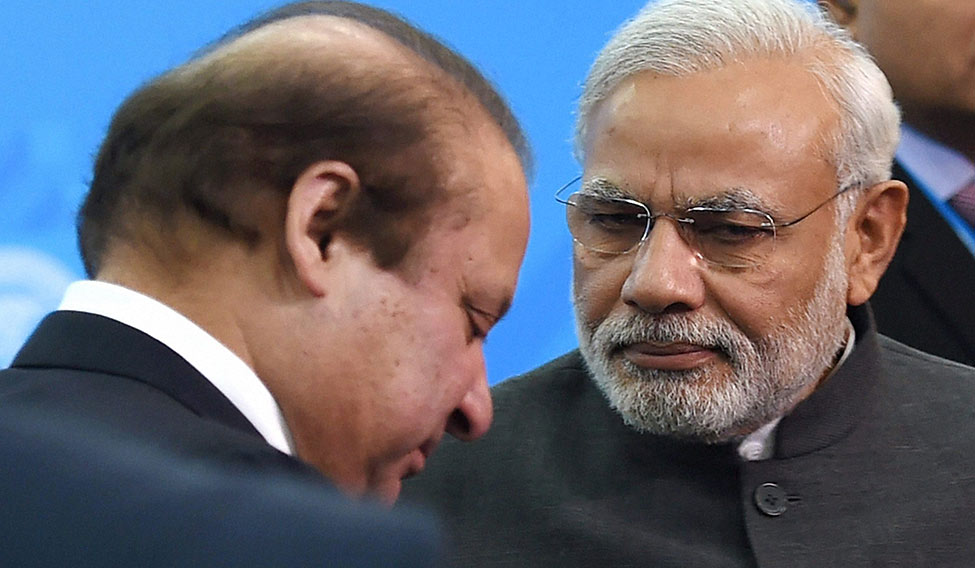There is an air of desolation under the distinct blue dome on Shanti Path in the heart of the diplomatic enclave in Delhi—the Pakistan High Commission. The mood had been sombre after Indian Army’s surgical strikes in Pakistan-occupied Kashmir. And the expulsion of Mehmood Akhtar, who was attached to the trade counsellor in the visa section, over spying charges has made it gloomier.
Pakistan quickly reacted to Akhtar’s expulsion by throwing out Indian official Surjeet Singh, citing violation of the Vienna Convention—a sort of tit for tat. Then on November 2, it pulled out five officials, though there has not been any official confirmation from the High Commission on this. Their names had allegedly come up during the investigations and in Akhtar’s statements. An Indian official who is involved in the investigation said more moles were under the scanner. “The ministry of external affairs and the Intelligence Bureau are coordinating,” he said.
It is said that the security of eight Indian diplomats in Pakistan has been compromised. Though there is no official confirmation on whether they would come home, it seems to be just a matter of time. “There is no environment of friendliness,” said a Pakistani official. And the “restrictions” seem to be more personal this time.
In June, the ministry of external affairs asked Indian diplomats in Islamabad to make arrangements for their children’s schooling outside Pakistan. The Pakistan foreign office, however, has issued no such advisory. “There was an incident in which a Pakistani child was picked on in school,” said an official. “There is Pakistani bashing on television every hour. Of course this will poison the minds of people. Children are no different.”
This state of hyped-up hostility is likely to continue—especially with the continuing infiltration of terrorists and constant violations across the Line of Control that spills out to become diplomatic snubs. Both countries are under domestic compulsions, said Rakesh Sood, senior fellow at Observer Research Foundation. And the narratives—parallel and completely divergent—are being played out.
India has been pressing for action on Pak-supported terrorism at every fora. From BRICS to bilateral meetings. Pakistan, on the other hand, has been hammering on about human rights violations in Kashmir. Any talk of isolation, a word that India has grabbed on with great delight, is being seen as Indian propaganda. With America in election mode and China having refused to be pushed on Pakistan, talks are not on the agenda. And won’t be for a while.
“What is happening is a different phase,” said Pakistani military commentator Ayesha Siddiqa. “It smells like the 1980s, but it is different. Both sides are not talking to each other at all. Pakistan’s military is talking to its own people and the Indian media is propagating that Pakistan has been isolated. It is a more dangerous phase. We have had war. But when people start mistrusting each other, that’s when there is great damage.”
Things are not likely to get any better. “Pakistan is going through interesting times,” said former diplomat Vivek Katju. There is a lot at stake—Prime Minister Nawaz Sharif is facing corruption charges on the Panama Papers leak. Though the agitation led by his fiercest opponent, Pakistan Tehreek-e-Insaf party’s leader Imran Khan, fizzled out, the Supreme Court has ordered a probe with the terms of reference almost exactly as the opposition demanded. “Sharif has already been embarrassed because of the destruction of the [terrorist] camps [in PoK],” says Rana Banerji, former special secretary at cabinet secretariat.
Then there is the transition in the Pakistan Army—General Raheel Sharif is due to retire this month. There are four names doing the rounds—Lt Gen Qamar Javed Bajwa, chief of general staff Zubair Hayat, Lt Gen Javed Iqbal Ramday (believed to be Sharif’s choice) and Lt Gen Ishfaq Nadeem Ahmad. “I would be surprised if Bajwa becomes chief of army staff,” said Banerji. “There is also the post of the chairman of the joint chief of staff that has to be filled. Ishfaq Nadeem, I would say, is on the best wicket.”
Till the flux is over, it won’t be clear how Pakistan will play out the game in the long term. And if Sharif manages to survive, he will be pushed to take a harder line on India. His biggest weakness at the moment, as Siddiqa pointed out, was not corruption but his failure to pursue the Kashmir agenda.
“The key question that the Narendra Modi government needs to answer is what action you can initiate to change the behaviour of Pakistan. By whom is the next question,” said Sood. “If the answer is the army, then the question is how will you do that?” The answer might not come through diplomatic solutions.








